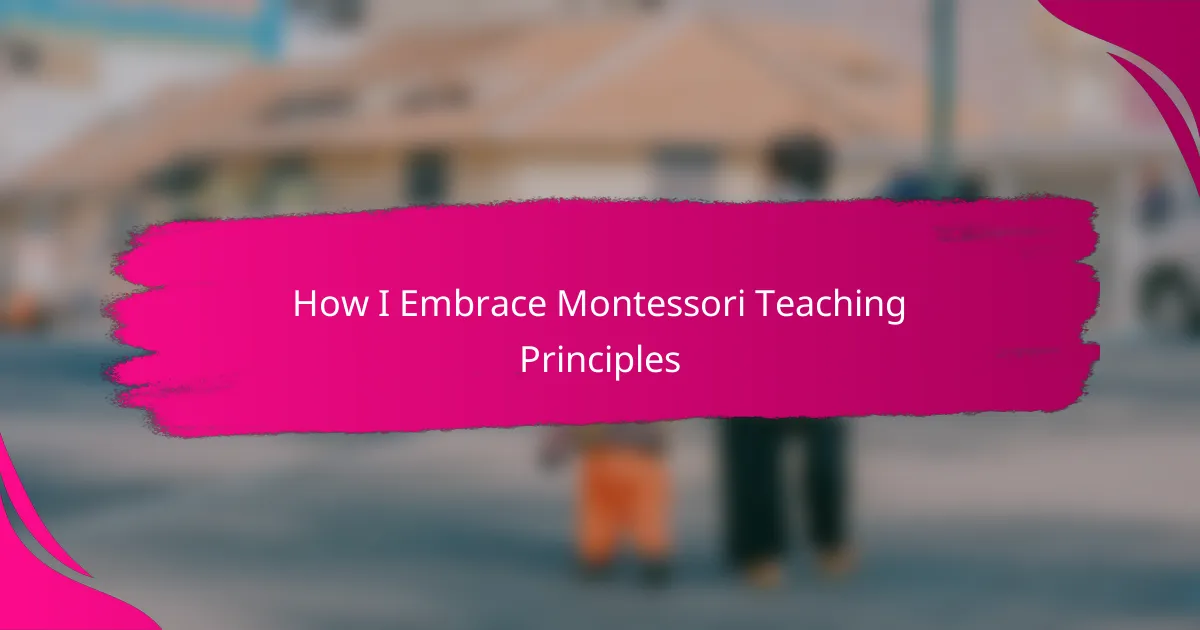Key takeaways
- Montessori education emphasizes nurturing a child’s natural curiosity and independence, fostering a joyful and engaging learning environment.
- Creating a prepared environment with accessible materials promotes exploration and self-directed learning, enhancing the child’s confidence and problem-solving skills.
- Encouraging independence through simple tasks builds responsibility and self-esteem, while allowing children to learn through trial and error fosters resilience.
- Montessori parenting is about mutual respect, patience, and collaboration, transforming the parent-child relationship into a partnership focused on growth and understanding.
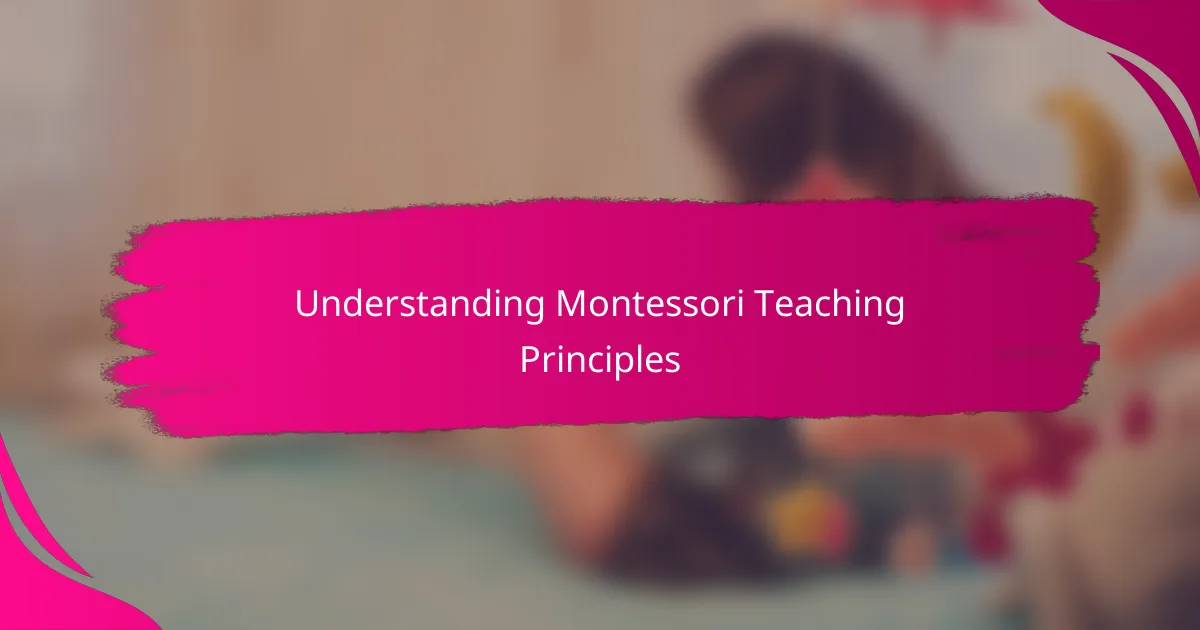
Understanding Montessori Teaching Principles
When I first encountered Montessori teaching principles, I was struck by how simple yet profound they are. The idea of nurturing a child’s natural curiosity instead of dictating what they should learn felt refreshing—have you ever noticed how kids seem to know exactly what they want to explore if given the chance? This approach truly honors the child’s independence and inner drive.
One principle that deeply resonated with me is the focus on creating a prepared environment. It’s not just about having toys or materials but arranging everything thoughtfully to invite exploration. I remember setting up a small corner at home where my child could choose activities independently, and it was amazing to see how confidently they engaged without constant guidance.
Moreover, observing respect for the child’s pace and choices has reshaped how I interact as a parent. Instead of rushing or pushing, I learned to step back and trust the process. That patience, although challenging at times, has enriched our relationship and made learning a joyful experience for both of us.
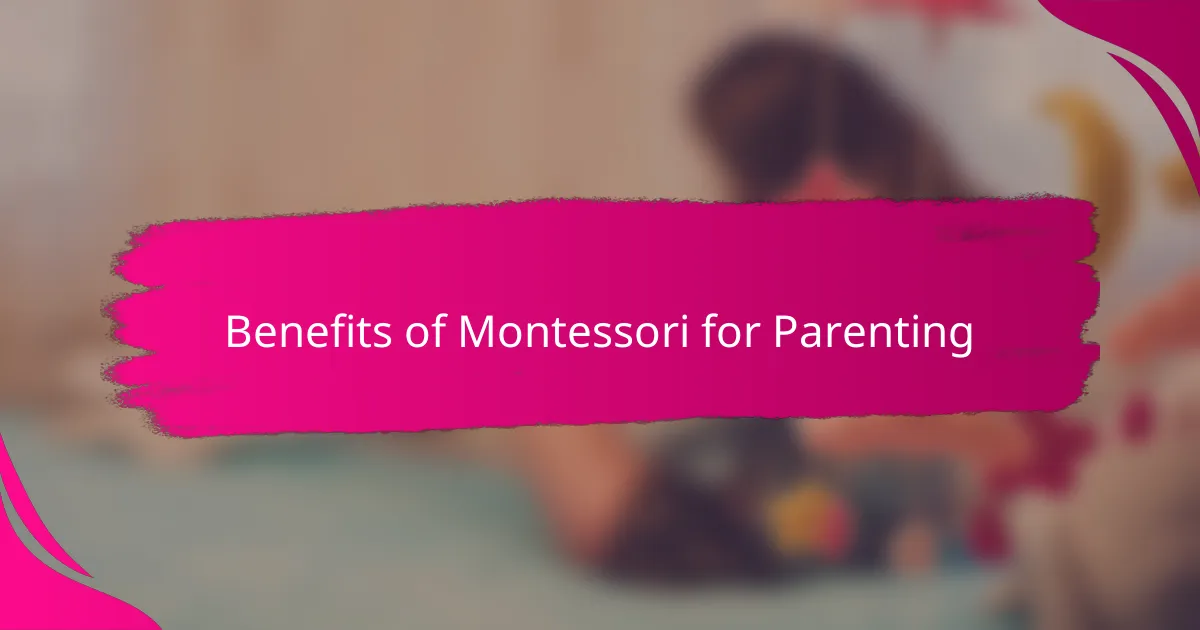
Benefits of Montessori for Parenting
Embracing Montessori principles has truly transformed how I parent by encouraging me to trust my child’s natural rhythm. Have you ever felt the urge to step in and correct or direct, only to realize your child thrives better when given freedom? This shift from controlling to supporting has deepened our bond and made daily interactions more harmonious.
One of the biggest benefits I’ve noticed is how Montessori empowers children to become independent problem-solvers. Watching my child figure things out on their own, without my immediate intervention, fills me with pride and reminds me of the importance of patience. It’s amazing how this approach reduces frustration on both sides, creating a calmer and more positive home environment.
I also appreciate how Montessori’s emphasis on respect extends to parenting itself. It encourages me to truly listen and observe rather than impose my expectations. This mindset has led to more meaningful conversations and a genuine understanding of my child’s needs, making our connection stronger than ever.
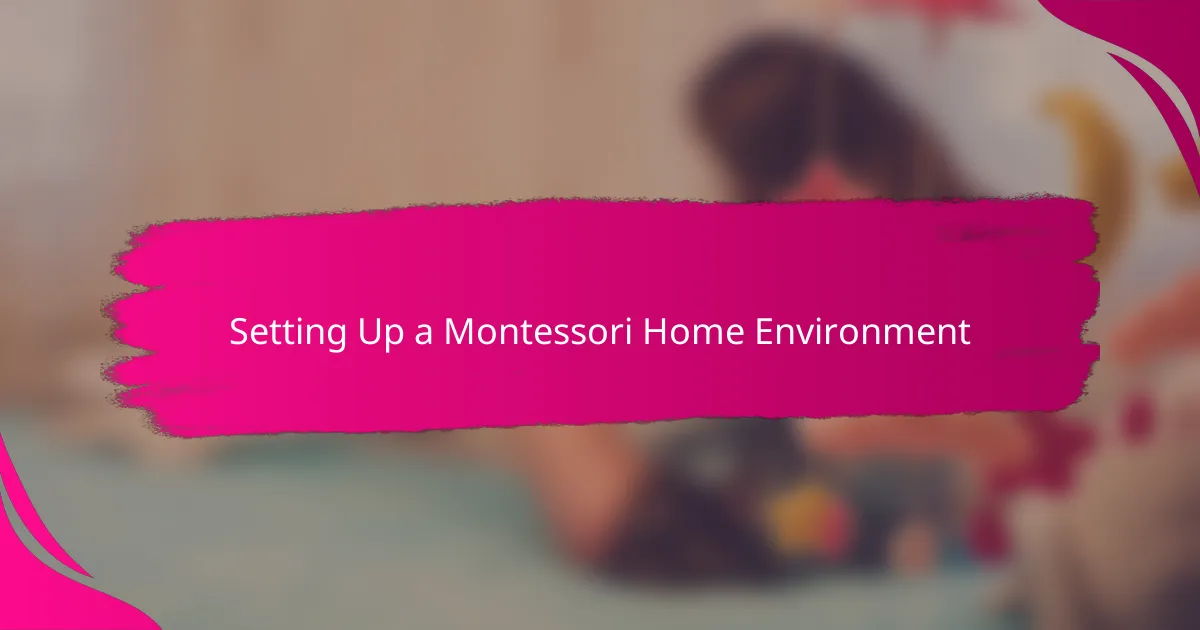
Setting Up a Montessori Home Environment
Creating a Montessori home environment for me started with simple changes—like low shelves where my child’s favorite books and activities are always within reach. Have you ever noticed how putting things at their eye level instantly sparks their interest? It’s incredible how such a small shift invites independence.
I made sure to choose natural materials and uncluttered spaces, which seems to calm my child’s mind and focus their attention. I remember one afternoon when my little one spent nearly an hour concentrating on a wooden puzzle, completely absorbed. That moment made me realize how important the environment is in nurturing deep engagement.
Sometimes I question if I’m being too hands-off, but then I see how my child confidently selects activities and learns at their own pace. Creating a space that respects this rhythm hasn’t just supported learning—it’s strengthened our trust in each other. Don’t you think that’s the essence of Montessori at home?
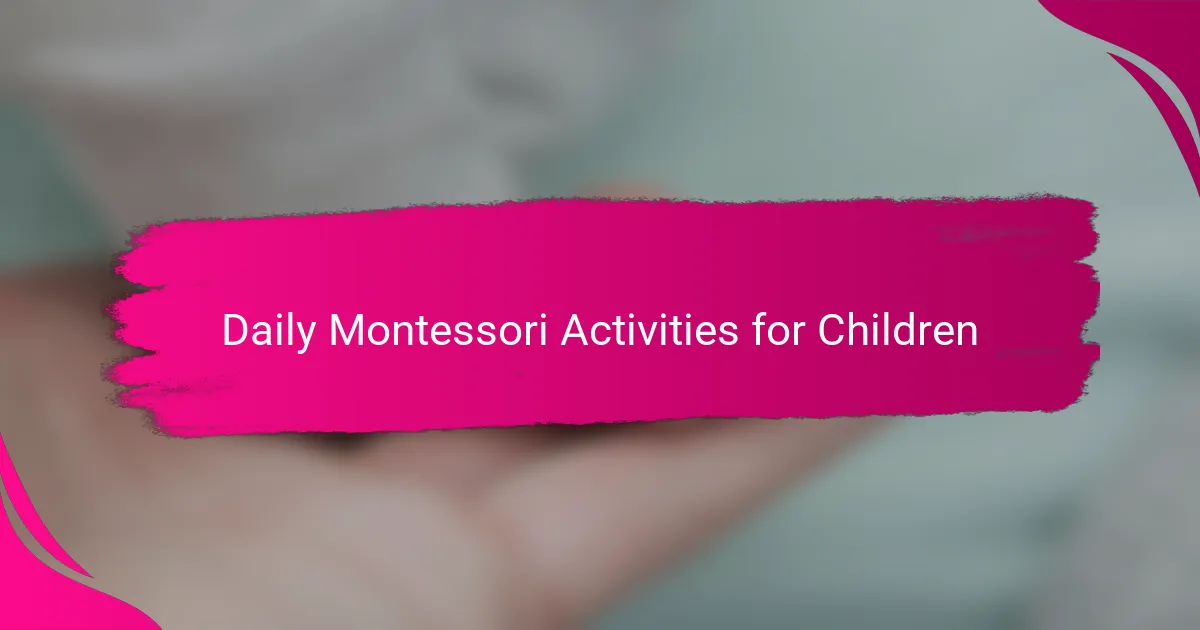
Daily Montessori Activities for Children
Every morning, I watch my child gravitate toward a range of carefully selected activities laid out on small trays. Have you ever noticed how children naturally pick tasks that match their interests and developmental stage? Seeing my little one pour water between two pitchers or sort colored beads with such focus reminds me how daily Montessori activities nurture concentration and fine motor skills effortlessly.
Sometimes, I prepare simple practical life tasks, like folding napkins or sweeping a small rug, that seem mundane but are powerful in building independence. It’s touching to witness my child beam with pride after completing these chores, as if saying, “Look, I can do this all by myself!” These moments make me appreciate how Montessori encourages real-world learning through everyday experiences.
On other days, nature-based activities become the highlight—like observing leaf textures or matching rocks by size. Have you ever tried turning an ordinary walk into a sensory adventure? These small, intentional experiences not only foster curiosity but also deepen our connection with the world around us and with each other.
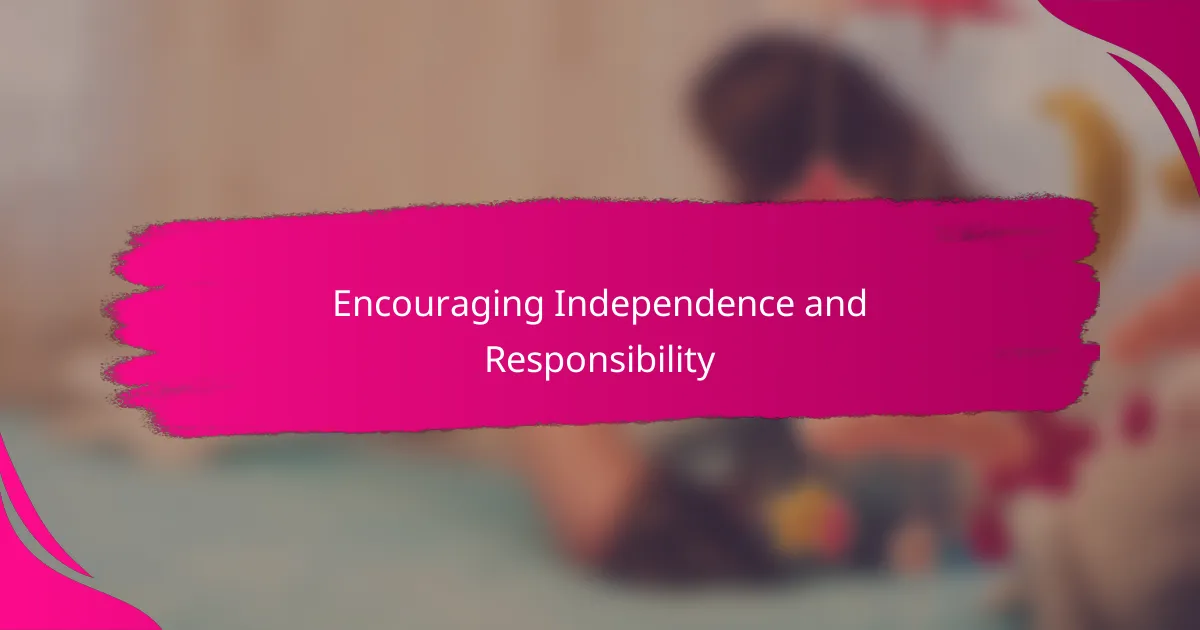
Encouraging Independence and Responsibility
Encouraging independence and responsibility is at the heart of Montessori for me. I’ve seen how giving my child simple tasks, like pouring their own water or tidying up toys, sparks a quiet confidence. Isn’t it incredible how such small moments help children feel capable and trusted?
Sometimes, I remind myself to step back and really let my child take charge, even if it means a little mess or slower progress. It’s challenging, but when I watch them decide how to approach a task, I realize this freedom builds real responsibility. After all, isn’t learning to manage oneself the greatest gift we can offer?
One memory that stays with me is when my child proudly set the table all by themselves for the first time. The beaming smile and sense of accomplishment in that moment made me understand how deeply independence fuels their self-esteem. Have you experienced that joyful pride when your child takes the lead? That’s where Montessori shines.
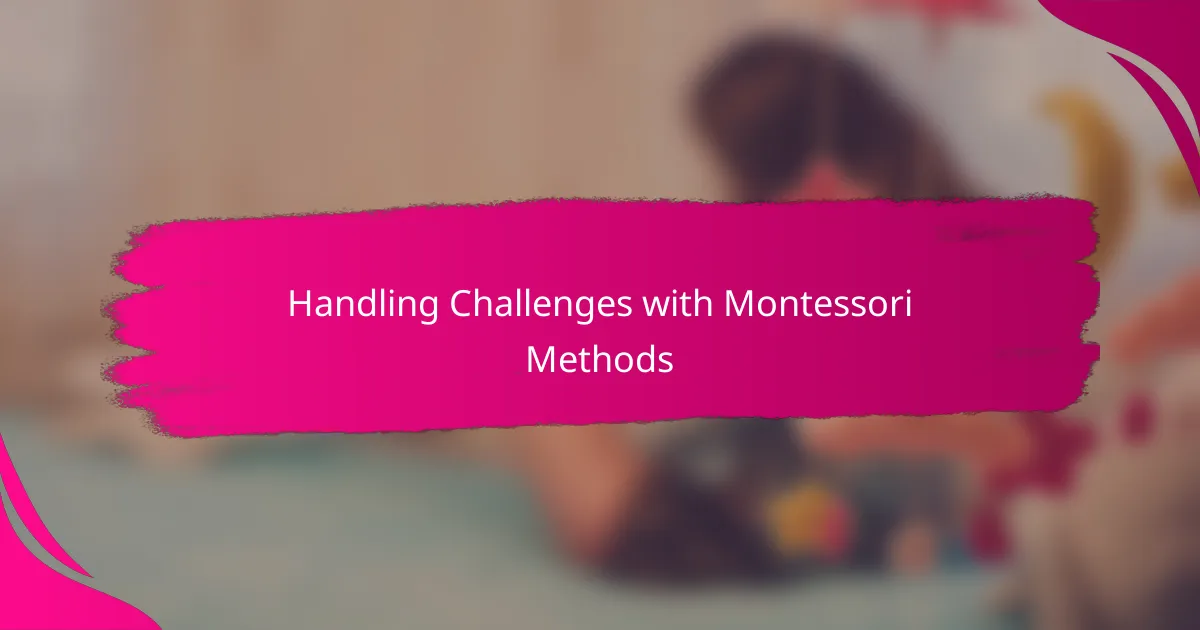
Handling Challenges with Montessori Methods
Navigating challenges with Montessori methods hasn’t always been smooth sailing for me. I remember feeling tempted to step in and correct when my child struggled with a task, but then I’d pause and ask myself—am I helping or hindering their growth? Letting go and allowing for mistakes felt uncomfortable at first, but I noticed it fostered resilience and problem-solving skills that no quick fix could teach.
Sometimes, staying patient during moments of frustration is the hardest part. There was a day when my child insisted on completing a puzzle alone, despite obvious difficulty, and I wrestled with whether to offer assistance. Reflecting back, I realize that those moments of struggle became powerful lessons in persistence and confidence, something I wouldn’t trade for an easy resolution.
Montessori methods challenge me to trust the process, even when it seems messy or slow. Have you found that embracing imperfection leads to the most meaningful breakthroughs? In my experience, allowing space for trial, error, and discovery in its own time transforms obstacles into stepping stones for both of us.
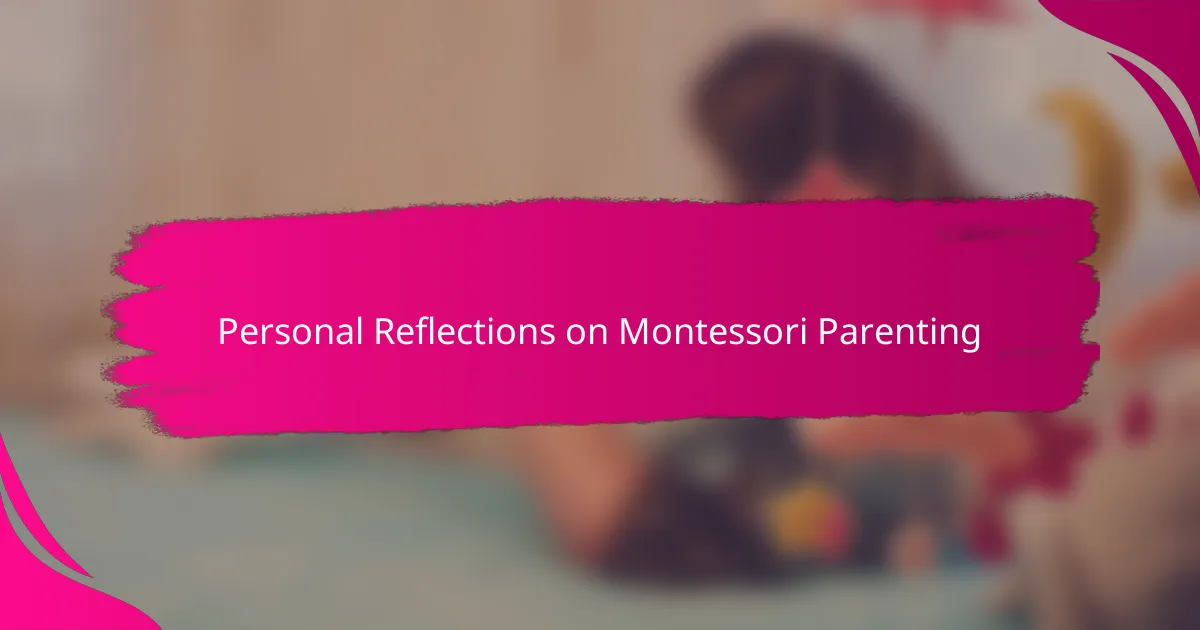
Personal Reflections on Montessori Parenting
Montessori parenting has taught me to cherish the unpredictable moments when my child surprises me with their creativity and determination. Have you ever felt that quiet pride when your little one figures something out completely on their own? Those instances remind me why patience and trust are so essential—they allow these sparks of independence to truly shine.
There are times I question if I’m doing enough or if I’m stepping back too much, but then I see how my child confidently navigates their world with enthusiasm and care. It’s a balancing act, no doubt, yet witnessing that growth gently unfold makes me appreciate the beauty of this approach more each day.
What moves me most is the deep respect Montessori instills, not just for my child, but in myself as a parent. It’s about listening closely and learning alongside them, which has transformed our relationship into a partnership built on understanding and love.
